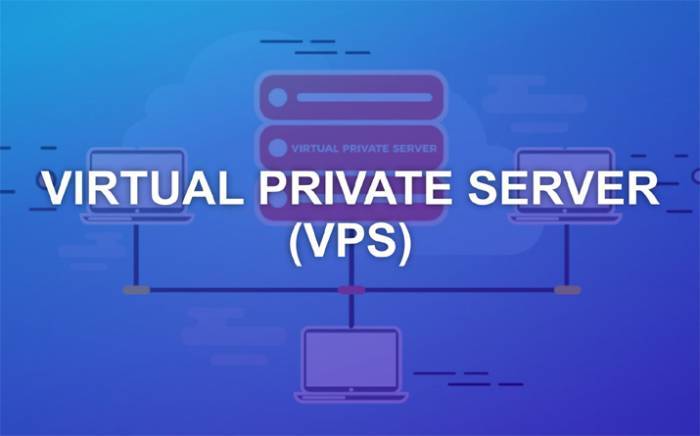Virtual Private Server is what the term VPS refers to in full. A virtual private server (VPS) is multi-tenant cloud hosting. A cloud or hosting provider makes the resources of a virtual server accessible to an end user over the internet in this scenario. The end user can access these resources. The idea of a virtual private server can be stated more clearly as a virtual machine that caters to the specific requirements of an individual user in the same way that a separate physical computer is dedicated to the activities of a single user.
The functionality of a conventional physical computer is replicated on the virtual dedicated server in the same way. On a single physical server, many virtual private servers, each with its operating system, can be deployed so that the server can serve multiple users simultaneously.

A web server program, a mail server program, and many types of application software for blogging and online business can all be part of a virtual private server. Virtual private servers provide a bridge between shared and dedicated web hosting by acting as an intermediary between the two types of services.
A virtual private server (VPS) user is granted super-user capabilities within the operating system. This is because virtual dedicated servers can run their operating system copies. The user can install any program compatible with working on the operating system that the VPS is using.
Because of advances in software and hardware for virtualization, many businesses are now able to provide virtual private server hosting at affordable prices. When hosting is unmanaged, the user is liable for maintaining and monitoring the server, and they can transfer an unlimited amount of data over a set bandwidth connection. In this scenario, the user is in charge of unmetered hosting. Any company can install and use virtual private servers within their local network.
VPSServer.com guarantees a 99.9 percent uptime and provides high-performance VPS hosting options that include ample disc space and RAM. Our guarantee also ensures that your applications receive the highest possible I/O performance. Our technical management team is made up of hosting specialists who specialize in VPS solutions.
Users who subscribe to one of our managed VPS hosting plans get access to support services around the clock. You will have access to instant, high-quality hosting services and resources, irrespective of the time zone in which you now find yourself. The dependable performance of our adaptable private servers will be offered at competitive pricing.
VPSServer.com uses a form of shared hosting known as “three-way storage” Having everything you need (data, programs, business apps, and resources) spread over three servers ensures their safety and availability at all times. You can rest certain that your information will remain secure at all times.
When the following apply, you should switch to a VPS:
- You’re worried about security.
- You start to experience high-traffic volumes.
- Your website is consistently running slowly.
- You have an online store.
- You need to install custom software.
- You run into server errors.
- You’re on a budget.
- You build websites for your clients.
How Does a VPS (Virtual Private Server) Work?
Even if you are still sharing the physical server with other users, Virtual Private Server hosting gives you the impression that you are using a dedicated server. VPS can function because it generates several virtual servers on a single physical server. The following components make up a virtual private server system:
VPS Node
The node refers to the actual piece of hardware. It manages a variety of virtual servers simultaneously. This node could refer to a single server part of the network maintained by the hosting business.
Hypervisor
The VPS node is where the hypervisor is running. It also manages the distribution of available resources. The hypervisors enclose the system resources, ensuring that each virtual private server lives up to the standards set by the users. In addition, hypervisors stop individual virtual servers from exploiting resources that belong to other servers in the cluster.
Virtual Server
The hypervisor will construct a partition, and the virtual server will execute inside of that partition. It operates in the same manner as a dedicated server. Users can install new software, restart their virtual server, or format their data without affecting the VPS node.
Customers of a hosting web service may access their server through the cloud, and it will appear to them as though they are using a dedicated server. Their Virtual Private Server is co-located on the same VPS node as several other servers. The hypervisor ensures that the process as a whole is carried out correctly.
Virtual Private Server vs. Dedicated Server
A virtual private server (VPS) is comparable to a combination of shared and dedicated servers. The actual server is partitioned into several virtual servers through a technology known as virtualization, which allows VPS to host multiple clients on the same system. On a virtual private server, each user is allotted a portion of the hardware resources of the parent server, which they do not have to share with any other users.
Pros and Cons of a Virtual Private Server
Pros:
Setup, Affordability, and Control
Cons:
Configuration and Security
A dedicated server is a type of web hosting in which the service user is provided with their physical server to keep their website. The customer enjoys high performance and a high level of security because they are not required to share the server’s resources with any other users. In addition to this, they have a wider degree of leeway in modifying both the hardware and the software to suit their requirements.
Pros and Cons of a Dedicated Server
Pros:
Resources, performance, Security, Customization, and Management
Cons:
Cost and Complexity
Customers who operate on an enterprise level are ideal candidates for dedicated servers. These are companies that have a significant volume of web traffic, a huge number of media files, or a requirement for extensive control to tailor their servers. A virtual private server (VPS) is the perfect solution for small and medium-sized organizations.
A virtual private server (VPS) can assist you in managing your website’s traffic and any surges that may occur if you are just getting started online but already have a big audience. VPS hosting is also more cost-effective than shared hosting.
Shared Hosting
The most prevalent type of web hosting is shared hosting, a solution that many new website owners find to be successful. When you acquire a hosting plan classified as shared, you agree to share the server’s essential resources with the owners of other websites hosted on the same server.
The use of shared hosting does come with a few drawbacks. Your website’s speed can suffer, for instance, if another website hosted on the same shared server has a sharp increase in the number of visitors. On the other hand, shared hosting is an excellent option to consider if you are just starting out with your website and do not anticipate an extremely high volume of visitors.
Dedicated Hosting
End customers have access to all of the hardware resources that are available on a given device when they use dedicated hosting. In contrast to VPS hosting and shared hosting, dedicated hosting provides the highest levels of privacy, protection, performance, and command over the hosted environment. The dedicated hosting approach comes with the highest price tag of the three options.
There is a tendency to use the phrase “dedicated servers” interchangeably with the term “bare metal servers.” Dedicated server companies who also offer bare metal hosting will often offer more cloud-like features in their dedicated server offerings.
VPS Hosting
Virtual private server hosting (VPS) is considered a more premium choice compared to shared hosting. VPS hosting makes shared resources available to an end user, who then has greater control over the system specifications and the overall software stack than is the case with shared hosting. This is in contrast to shared hosting, which does not offer this level of control.
The other two models scale more easily than this one does when it comes to controlling, pricing, and ease of use, virtual private server (VPS) hosting lies somewhere in the middle of shared and dedicated hosting.
To Wrap Up
The process of selecting the appropriate server for the establishment of a website is one that is complex and involved. When there are so many different options on the market, it can be extremely difficult to choose which product or service to purchase.
It is best to consider the existing state of your company and the degree to which it is likely to expand in the near future when making a decision between dedicated servers and virtual private servers.






































